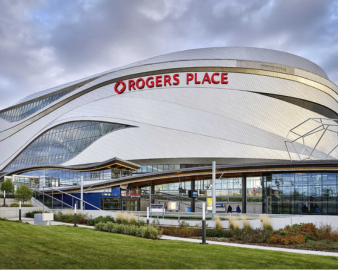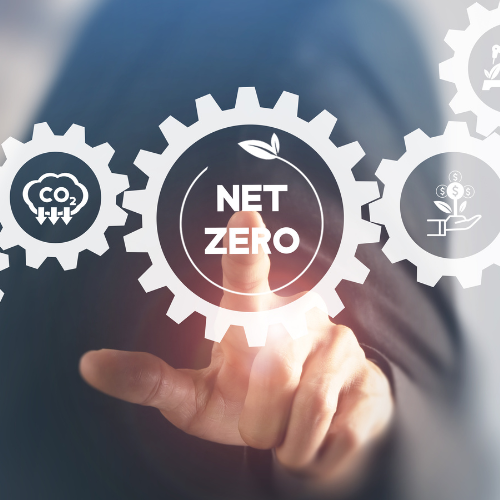Many municipalities have declared a climate change emergency and are actively seeking ways to reduce greenhouse gas (GHG) emissions to meet the emission reduction targets set for 2030 and 2050. Read Jordan Dermo's perspective on best practices for achieving these net-zero targets.
Earlier this year, I had the pleasure of speaking at the Connect 23 conference in Winnipeg, where municipal leaders from across Manitoba gathered to discuss opportunities for their parks and recreation facilities with industry experts. As an attendee, it was inspiring to speak with these leaders about how climate change has impacted their communities and learn about their eagerness to find solutions to lower their greenhouse gas (GHG) emissions.
Achieving net-zero targets has become a significant global focus for businesses, governments, and individuals. Last year, I spoke at the Connect 22 conference, and I am thrilled to see how far we have come in terms of net-zero planning. More and more municipalities have declared a climate change emergency and are looking for ways to reduce their GHG emissions to achieve the 2030 and 2050 emission reduction targets. It has been rewarding to discuss the GHG reduction opportunities available for refrigeration plants with these communities. I am proud to work for a company that recognizes the impact that refrigeration and refrigerants have on our environment and economy and is actively developing viable solutions to help municipalities transition into a more sustainable and environmentally friendly future.
One of the highlights of the conference was the introduction of CIMCO's newest net-zero ready product, Thermal Force One (TF1). This system will be a game-changer for the thermal management of both heating and cooling within an ice plant. The system is designed to provide heating, cooling, and air conditioning through one system for the entire building. By utilizing Natural or green heat sources both on and off the package like geothermal, air- sourced coolers, effluent or sewage water the TF1 drastically reduce if not fully eliminate the buildings reliance on equipment that use natural gas. It can also be scaled to convert 100% of the waste heat generated from the refrigeration process to heat surrounding buildings. The feedback from the crowd was outstanding, as they saw the need to raise our expectations and challenge the status quo when it comes to the integration of these systems. As we continue to decarbonize our economy, products like the TF1 will play a crucial role in creating a safer and more sustainable future.
Another critical topic of discussion at the conference was the impact of refrigerants on the environment. Attendees expressed their concerns over the environmental impact of synthetic refrigerants and the potential phase-out of many of these refrigerants, which could result in the need to replace systems before their end of life. We also discussed the overall danger refrigerants pose and the importance of proper design, training, and maintenance of these systems to ensure safe operation. It was great to have open conversations based on facts, not fear
The TF1 includes a component that was specifically designed to address these safety concerns, called the CIMCO Smart Transfer. This system automatically senses if there is a refrigerant leak and contains it within a designated vessel. This feature offers an excellent solution to ensure the safe containment of refrigerants in the rare event of a leak. As well as providing peace of mind that, in the event of a leak, the refrigerant charge will not be released into the atmosphere, thus reducing downtime and repair costs.
The Connect 23 conference was an amazing experience, and I am excited about the role that Thermal Force One will play in decarbonizing our communities. The first step in any transition is awareness, and the more I speak with municipalities, the more optimistic I become that Canada will be able to do our part in lowering our GHG emissions. It is imperative that businesses and governments continue to work together to develop and implement innovative solutions and technologies that will help us achieve a more sustainable future.

Jordan Dermo – Business Development Manager
Meet Jordan Dermo, CIMCO Refrigeration's Business Development Manager and a key member of the Net Zero team. Passionate about sustainable practices and an outdoor enthusiast, Jordan actively advocates for the role of refrigeration systems in combating climate change. With the opportunity to engage municipal leaders across Canada, Jordan assists communities in devising plans to reduce GHG emissions from their ice rinks. CIMCO's Net Zero team aims to showcase the environmental and financial benefits of Net Zero solutions for ice rinks, supporting communities in transitioning to a sustainable era. Jordan's dedication includes staying updated on Net Zero funding opportunities to provide valuable insight and guidance during the application process.
Related Posts

Innovation Day 2024

Decarbonizing the Industrial Sector Through Natural Refrigerant Heat Pumps

VFW Sports Center, North Dakota
STAY UP TO DATE
Get the latest industry insights and important updates delivered right to your inbox.
|
|



